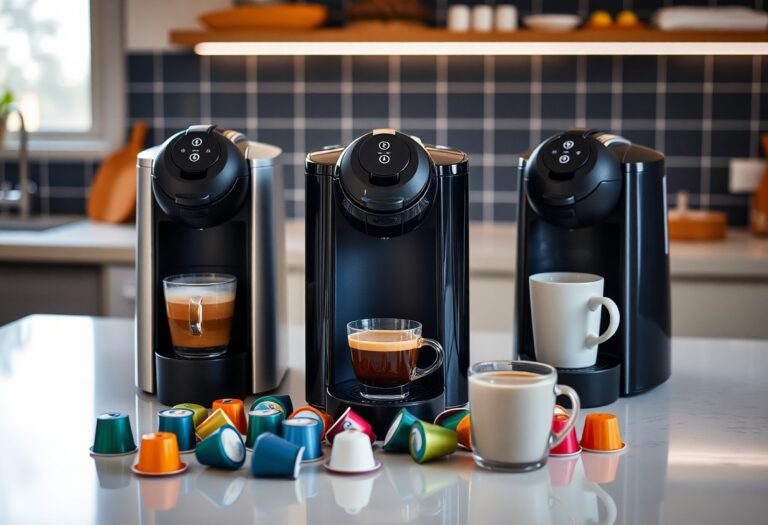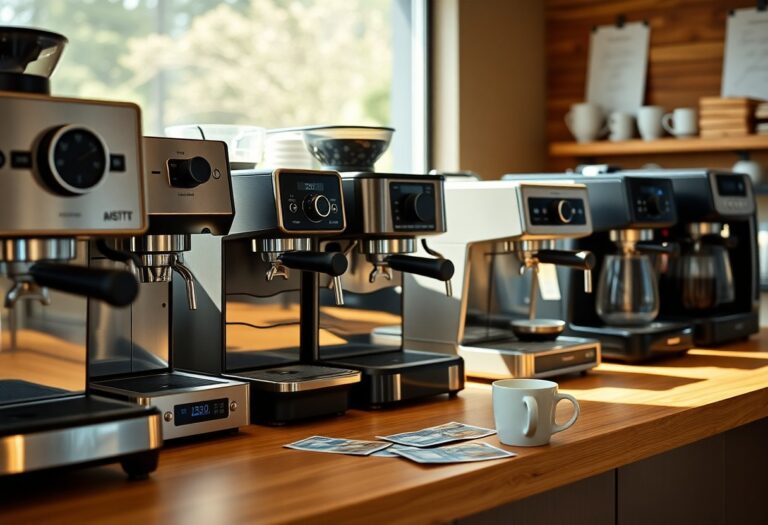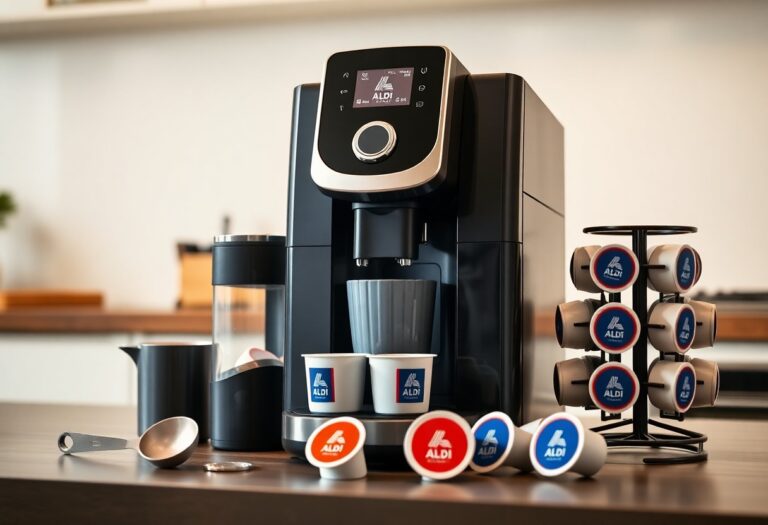How Often to Descale a Coffee Machine – Maintenance Schedule
There’s a lot you might not know about keeping your coffee machine in top shape, and descaling is a vital part of that process. If you want to enjoy rich flavors and prevent potential damage to your machine, you should familiarize yourself with how often to descale. Maintenance frequency can vary based on your water quality and usage, but typically, descaling should occur every one to three months. For detailed insights, check out this guide on Espresso Machine Cleaning & Maintenance.
Key Takeaways:
- Descale your coffee machine every 1 to 3 months, depending on water hardness and usage frequency.
- Monitor for signs of scale buildup, such as slower brewing times or unusual sounds during operation.
- Use a descaling solution specific to your coffee machine type for effective cleaning.
- Follow the manufacturer’s guidelines for descaling to avoid voiding the warranty.
- Regular descaling can enhance coffee flavor and prolong the life of your machine.
The Dangers of Neglecting Descaling
The consequences of not descaling your coffee machine can significantly affect both your brew quality and machine longevity. Ignoring this vital maintenance step can lead to a buildup of limescale, which impacts the functionality and efficiency of your unit. For more insights, check out How Often to Clean Coffee Maker for Perfect Brews Every ….
Impact on Coffee Quality
A freshly brewed cup of coffee should stimulate your senses, but scale buildup can ruin the experience. The minerals deposit alters water flow and temperature, resulting in uneven extraction and ultimately a bitter or flat taste. You may notice your once-flavorful brews become weak and unappealing.
Potential Damage to the Machine
Failing to descale your coffee machine can lead to significant internal damage over time. Buildup degrades components like the heating element, pump, and water lines, which can result in malfunction or total breakdown. Even if your machine seems to work fine now, neglecting descaling can shorten its lifespan dramatically.
For example, a heating element that struggles to function due to limescale buildup might use more energy than necessary, increasing your energy costs while making your coffee less enjoyable. Over time, these small issues compound, leading to costly repairs or replacements. Regular descaling saves you from potential headaches and ensures your coffee machine continues to perform at its best.

Determining Your Coffee Machine’s Descaling Needs
Your coffee machine’s descaling needs are influenced by several factors, including water quality and usage frequency. Hard water can lead to faster mineral buildup, while heavy usage increases scaling. Additionally, your machine’s type might dictate different descaling intervals. Thus, understanding these elements helps ensure optimal performance and longevity for your coffee maker.
Factors Influencing Descaling Frequency
Several variables will determine how often you need to descale your coffee machine:
- Water hardness – Hard water leads to quicker scaling.
- Frequency of use – More frequent brewing necessitates more regular descaling.
- Machine type – Different types of coffee makers may have varying descaling requirements.
- Environmental factors – Humidity and temperature can impact buildup rates.
Thou should assess these factors periodically to maintain peak functionality.
Signs That Descaling is Necessary
Recognizing when to descale your coffee machine involves watching for specific signs that indicate accumulated mineral deposits. Reduced water flow, unusual noises, and off-tasting coffee often signal it’s time for a cleaning. If you notice a white residue around the machine or difficulty in brewing cycles, it’s likely that scaling has built up to a concerning level.
Regular monitoring can save your machine from long-term damage, so pay close attention to any performance changes. You may also encounter a decrease in coffee temperature or see your machine’s indicator light signaling a need for maintenance. Descaling can lead to a noticeable improvement in coffee taste and brewing efficiency. By staying attuned to these signs, you can maintain the best possible experience with your coffee machine.
A Tailored Descaling Schedule for Your Situation
Your unique coffee consumption patterns and water quality play a significant role in determining how frequently you should descale your machine. A tailored schedule allows you to optimize the performance of your machine while enjoying the best flavor from your coffee. Take into account factors such as usage frequency, type of coffee maker, and local water hardness to create a maintenance routine that suits your specific needs.
Daily, Weekly, and Monthly Recommendations
For daily upkeep, clean the coffee pot and brew basket to prevent residue build-up. Weekly, run a hot water cycle to flush out any remaining coffee oils. A monthly descaling is generally effective, especially if you use your coffee maker frequently. Adjust these intervals based on your machine’s performance and water quality.
Special Considerations for Hard Water Areas
Living in a hard water area requires more attention to your coffee machine’s maintenance. Hard water contains higher levels of minerals like calcium and magnesium, which can lead to accelerated scale buildup. You might find yourself needing to descale more often than the typical recommendations suggest.
If your water hardness is significantly high, consider descaling every two to four weeks instead of monthly. Investing in a water softener or using filtered water can mitigate these issues, prolonging the life of your coffee machine. Regular testing kits for water hardness can also guide you in establishing the best descaling schedule, ensuring your coffee remains delicious and your machine stays in optimal condition.
Descaling Techniques: Choosing the Right Method
Selecting the appropriate descaling technique for your coffee machine can significantly impact its longevity and performance. Two primary approaches exist: using commercial descaling solutions or opting for DIY methods, each with their pros and cons. Your machine’s specific requirements and your personal preferences will guide you in making the best choice.
Commercial vs. DIY Solutions
Commercial descaling products are typically formulated to quickly dissolve mineral deposits without harming your coffee machine. These solutions offer convenience and consistency, especially for busy settings. Conversely, DIY solutions like vinegar or citric acid can be effective and more budget-friendly for home users, but success often depends on following instructions closely and knowing the right ratios.
Step-by-Step Guide to Effective Descaling
An effective descaling process involves several systematic steps tailored to your coffee machine type. Begin by emptying and rinsing the water reservoir, adding the descaling solution as instructed. Run a brewing cycle and let the solution sit, then flush with clean water. Finally, run a few cycles with plain water to ensure no residual tastes remain.
Detailed Steps for Effective Descaling
| Step | Action |
|---|---|
| 1 | Empty and rinse the water reservoir. |
| 2 | Add descaling solution (commercial or DIY) as per guidelines. |
| 3 | Run a brewing cycle to distribute the solution. |
| 4 | Let the solution sit for the recommended time. |
| 5 | Flush the machine with clean water by running multiple cycles. |
Following these steps will ensure that your coffee machine remains free from limescale buildup, enhancing its efficiency and the quality of every brew. Regular descaling can extend the lifespan of the machine, providing you with superior coffee experiences for years to come.

Maintenance Beyond Descaling: Keeping Your Coffee Machine in Top Shape
To extend the life of your coffee machine, it’s necessary to implement a routine that goes beyond just descaling. Regular interventions can prevent malfunctions and ensure every cup of coffee is as delicious as the first. Regular maintenance will not only enhance performance but also contribute to a consistently satisfying coffee experience.
Regular Cleaning and Care Tips
In addition to descaling, follow these simple cleaning tips to keep your machine in prime condition:
- Wipe down the exterior regularly to avoid dust buildup.
- Remove and clean the carafe and other removable parts after each use.
- Run a water cycle through the machine weekly for cleanliness.
- Keep the brew basket and water reservoir free of coffee oils.
Assume that these small efforts will pay off in the long run, drastically improving your coffee machine’s performance.
The Role of Routine Maintenance for Longevity
Investing time in routine maintenance can significantly impact how long your coffee machine lasts. Performing small tasks such as cleaning and replacing worn parts can mitigate wear and tear, preventing costly repairs or replacements down the line. Maintaining optimal water quality and monitoring for any signs of buildup helps protect critical components. A well-maintained coffee machine not only brews better coffee but also enhances your investment, allowing you to enjoy superior coffee experiences for years to come.
Conclusion
Now that you understand the importance of regular descaling to maintain your coffee machine’s performance, you can establish a maintenance schedule that suits your usage habits. If you use your machine daily, aim to descale every one to three months, while lighter users may extend this to every six months. Be sure to monitor your machine’s indicators and the quality of your coffee, as these can signal when it’s time for another descaling. With proper care, you’ll ensure that your coffee remains fresh and flavorful for years to come.
FAQ
Q: How often should I descale my coffee machine?
A: The frequency of descaling your coffee machine largely depends on the hardness of your water and how often you use it. Generally, it is recommended to descale every 1 to 3 months for optimal performance. If you live in an area with hard water, you may need to descale more frequently. Pay attention to any warnings or indicators from your coffee machine as well.
Q: What are the signs that my coffee machine needs descaling?
A: There are several signs that may indicate it’s time to descale your coffee machine. These include a decrease in brewing temperature, longer brewing times, unusual noises, and changes in the taste of coffee. Additionally, if your machine displays a descaling alert, it is time to take action.
Q: What products should I use to descale my coffee machine?
A: You can use commercial descaling solutions specifically designed for coffee machines, which are typically safe and effective. Alternatively, a mixture of equal parts white vinegar and water can be used as a natural descaler. Ensure that you follow the manufacturer’s instructions for your specific machine to avoid any damage.
Q: Does descaling my coffee machine improve the taste of coffee?
A: Yes, regular descaling can significantly improve the taste of your coffee. Mineral build-up from hard water can affect the flavor profile and aroma of your brews. By removing these deposits, you ensure that your coffee machine operates efficiently and produces fresher and more flavorful coffee.
Q: Is descaling necessary for all types of coffee machines?
A: Descaling is necessary for most coffee machines, including drip coffee makers, espresso machines, and single-serve machines. Some machines may have specific maintenance requirements, so it’s advisable to consult the user manual for your model to confirm the best practices for care and maintenance.







